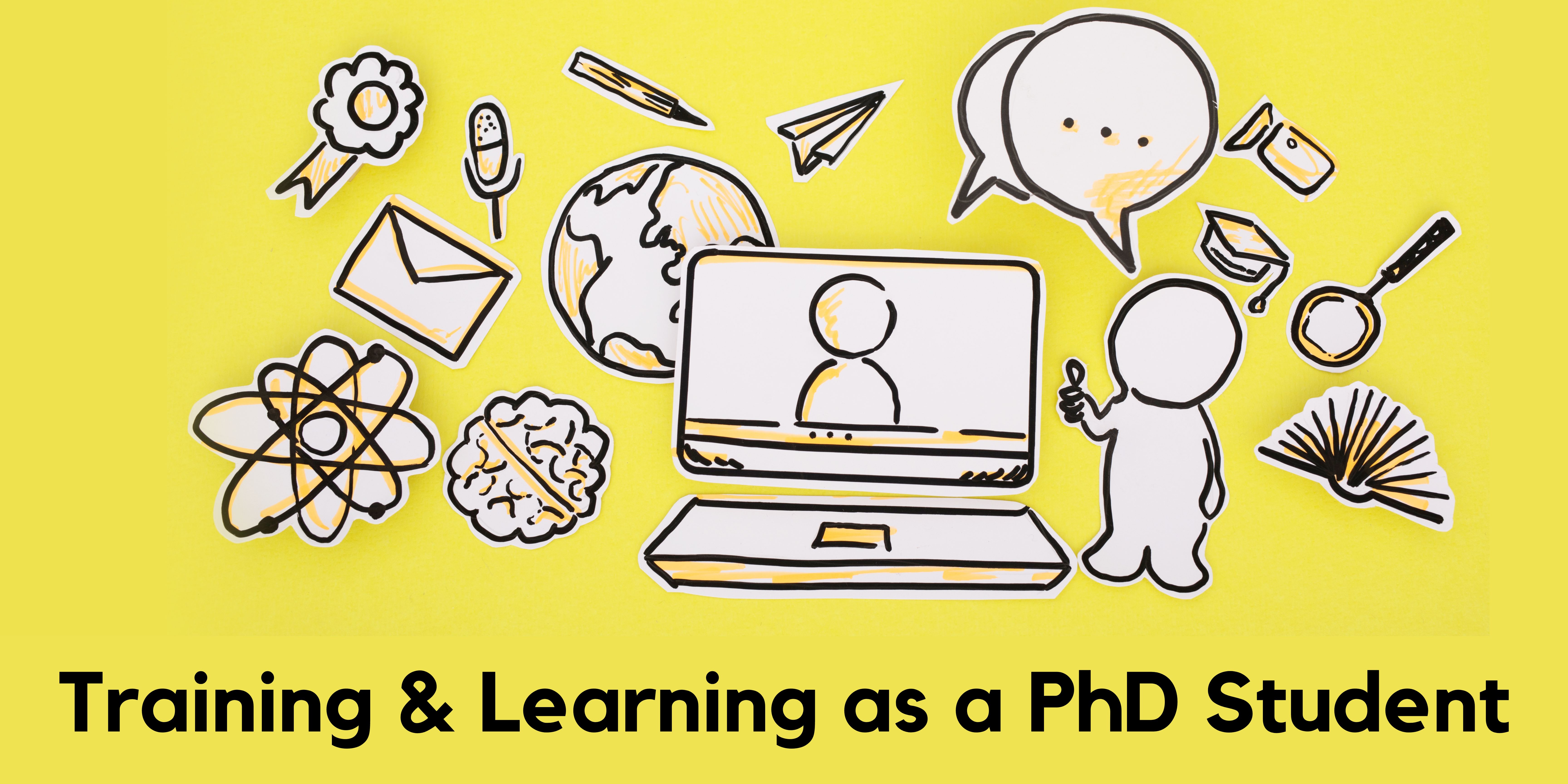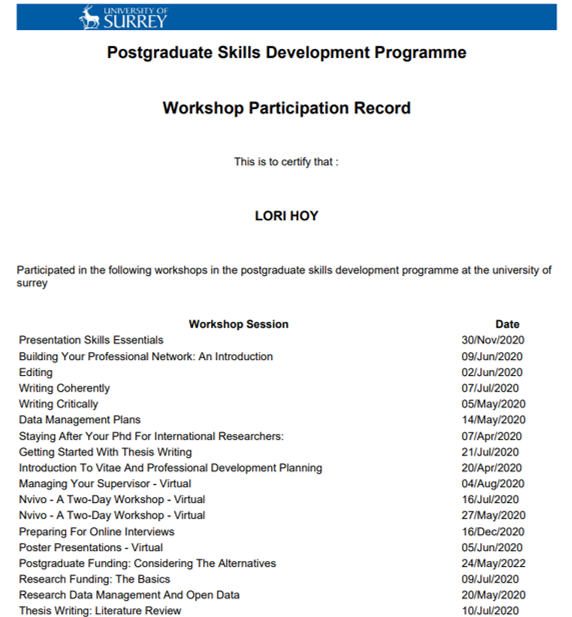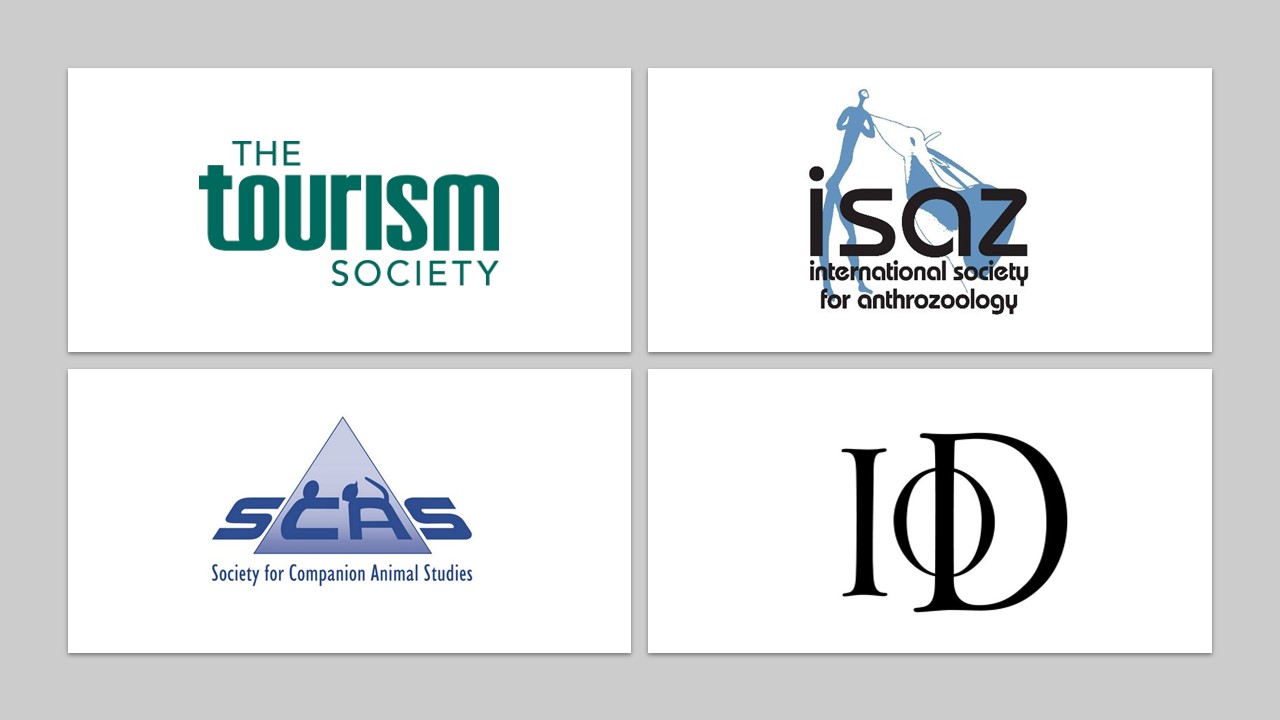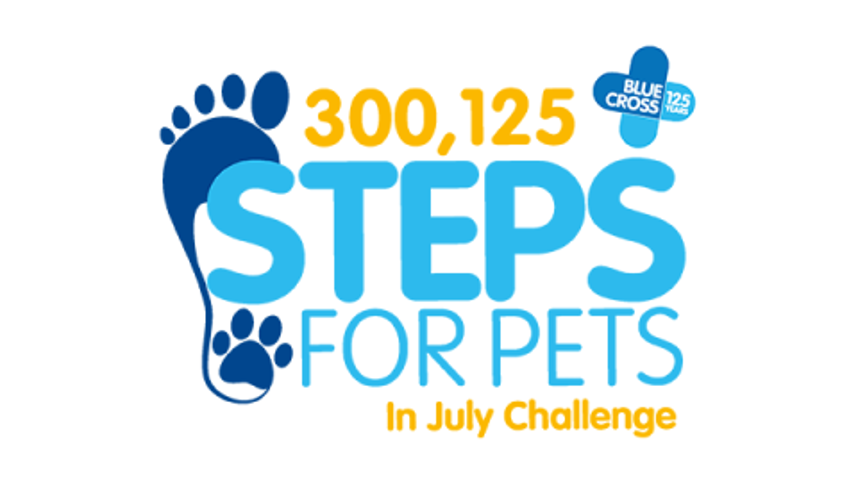As a PhD student at the School of Hospitality & Tourism Management who has just started their 3rd year, I thought this was a good time to reflect upon all of the training and learning opportunities that I have had so far and continue to be offered. I have been tracking the training courses that I have done since the start of my PhD in April 2020. Currently, I have 160 trainings on this spreadsheet. However, this shouldn’t sound overwhelming. In fact, many of these trainings were not only great opportunities to learn, but I also enjoyed them!
I should note that it is a really good idea to keep a list of the trainings that you participate in as a PhD student. Having this list allows you to reflect on everything that you have learned and it makes it easy to add them to the Progress Reviews that you complete every six months as part of the PhD programme. Personally, when first starting my PhD, I found the sessions on Writing (Coherently/Critically/Concisely) and ‘Ethics & Governance’ to be very useful.
Doctoral College
The Doctoral College offers a wide range of training and learning opportunities through the Researcher Development Programme. Three of these are compulsory for all PhD students: ‘Welcome to your Doctorate’, ‘The Confirmation Process’, and ‘The Viva Examination’. These courses are only the tip of the iceberg, however. There are many, many courses offered in subject areas such as analytical skills, career and professional management, impact, information skills, presenting and communicating research, publishing, research design, research funding, writing skills, and more.
I also regularly participate in ‘The Focus Zone’ and the mini and all-day Writing Retreats that are offered. Both programmes provide an opportunity to get yourself focused and make progress on your goals. I try to participate in a few of these sessions every month.
Plus, there are also reoccurring opportunities through the Doctoral College to engage with other PhD students at the University. For example, every week the Researcher Café is held virtually for an hour on Fridays. It is a great time to informally connect with other researchers.
Your School
The different Schools within the University also have different training and learning opportunities for their PhD students. At the School of Hospitality & Tourism Management we have a Researcher Development Programme in which seminars are given on a wide range of topics such as specific methods, analysis, publishing, etc. These are on Wednesday mornings and usually run for 2 to 2.5 hours.
Plus, for one hour on Wednesday afternoons we have the School’s Weekly Research Seminar Series. These semiars focus on various researchers from inside and outside of the University presenting their research. Also, at the beginning of these sessions PhD students often do a 5-minute presentation about their research to introduce their topic and research plan to the wider School research community.
Other Academic and Company
For additional training and learning there are tons of great resources both academic and provided by companies. Some of these opportunities are free and others have a cost. For example, in order to refresh my statistics skills, the Doctoral College let me know that Goldsmiths, University of London was offering a free 8-part course.
Other groups such as the British Library and Parliament also put on free webinars to let researchers know how they can access and use their resources. Additionally, editors of academic journals often do short, free sessions to let researchers know more about publishing, the journal, and expectations. I have attended sessions for Annals of Tourism Research, the Journal of Travel Research, and Tourism Management.
Finally, if you are using an advanced analysis method such as structural equation modelling, you are likely going to need additional training. I took extensive courses in both SEM using Mplus and PLS-SEM using SmartPLS. These courses were pricey but they were the best way to gain the skills that I needed for my PhD thesis. Thankfully, there is an annual Research Fund for PhD students that can be used to cover expenses for things like training, data collection, and attending conferences.
Societies and Clubs
Societies and clubs within and outside of the University provide great opportunities for additional learning. I have previously participated in lots of activities with the University’s entrepreneurial club, Student Enterprise. Plus, I am a member of four different external societies: The Tourism Society, The International Society for Anthrozoology, the Society for Companion Animal Studies, and the Institute of Directors. Each one of these organisations offers monthly opportunities for learning and even larger events such as conferences. I really enjoy taking part in these societies because I am able to get varied perspectives on topics related to my research from tourism to animals to business. I am really looking forward to taking part in some virtual conferences with these societies over the summer!
Demonstration Duties
If you are interested in pursuing a career in academia then many Schools offer the opportunity to participate in demonstration duties. In the School of Hospitality & Tourism Management this initially takes the form of marking undergraduate students’ papers and can then progress to assisting in running seminars under the guidance of a lecturer. This is a great opportunity to gain experience to enhance your future employability in higher education.
In my School, PhD students are all given the opportunity and are encouraged to participate in demonstration duties. I participated one term doing marking, however I am not interested in a career in academia so decided to focus that portion of my training and learning time on a part-time job and volunteering.
However, if you are interested in teaching in higher education, the University also offers all PhD students the opportunity to complete the Graduate Certificate in Learning and Teaching. You can learn more about this opportunity as explained by another PhD student, Daisy here.
Work Experience
If you are interested in working during your PhD that is usually an option. I am an international student, and I am allowed to work up to 20 hours per week. However, I would never be able to work that many hours while also making progress on my PhD and with my other personal commitments. As a result, I work remotely 8 hours a week for a London-based IT recruiting agency doing digital marketing. It is a great role that has tons of flexibility in when and where I work. Plus, it all allows me to be creative in a different way and keeps my marketing skills fresh.
There are also opportunities for work experience and placements directly through the University. There are specific PGR opportunities which are often short-term on a contract basis. Recently, the University has also been developing placement opportunities for PhD students through the Doctoral College PGR Placement Scheme. There is a list of placement opportunities already approve by the University or PhD students can search for existing placement schemes with organisations or design their own placement with a company or group. Doing a placement can enhance potential career opportunities, develop new skills, and improve communication skills. You can learn more about placements, internships, and career support from the University here.
Volunteering
Finally, volunteering is a great way for additional training or learning while completing your PhD There are lots of great charities looking for volunteers for all kinds of roles and with a variety of time commitments. A few places to look if you are interested in a volunteering role include Charity Job and Reach Volunteering , or you can look at the volunteer opportunities directly with any charities that you might be interested in assisting.
I currently volunteer for Blue Cross as a Fundraising & Events Volunteer. This team has been impacted quite a bit by COVID-19, however we have continued to raise money for the animals in Blue Cross’s care by doing digital events. This summer, I am helping with the ‘300,125 Steps for Pets in July Challenge’ working on the Facebook group’s page to welcome new members, post engaging content, and encourage all of those participating in the fundraiser. It is truly rewarding and interesting to learn more about being an admin for a Facebook group and how to increase group engagement.
As a PhD student there are tons of great opportunities for training and learning. I would encourage those considering a PhD and those currently in a PhD programme to have a further look at all of the great opportunities available and get involved!




